I’ve Loved You For So Long: The Aces on Mental Health, Identity, and Music
The indie band chats about their upcoming album, and why it’s their most honest music yet.
Escrito por Esther Fernandez
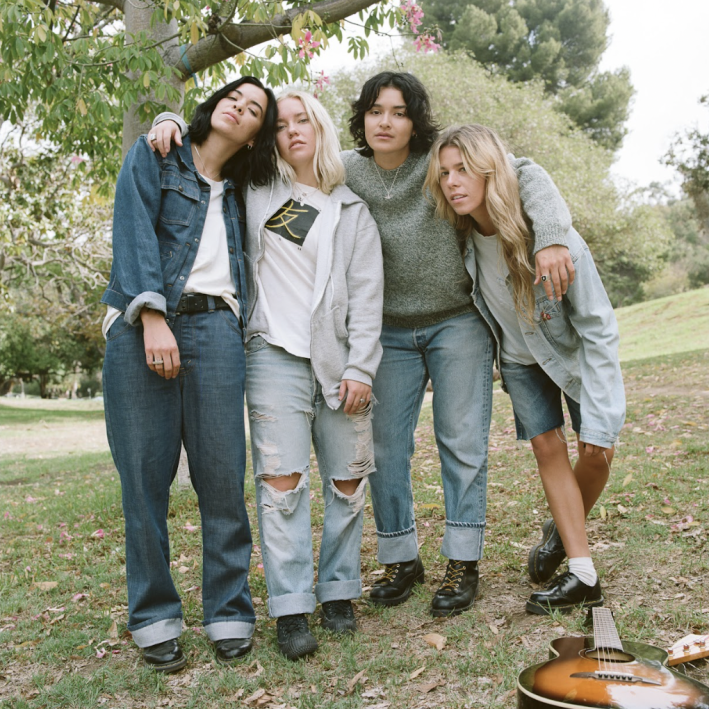
01 The Aces are a four-piece, all women indie band from the suburbs of Utah.
02 Their newest album, “I've Loved You For So Long” comes out June 2nd.
03 They chatted with copywriter Esther Fernandez about mental health, leaving the church they grew up in, the importance of queer representation, and more.
Hey I'm Esther, a copywriter at Made of Millions. I’m super excited to be chatting with you guys today! Our team is made up of music lovers who have all struggled with mental health in one way or another. We love connecting with people who use art as a means of advocating and processing tough feelings.
All that said, can you tell us about your upcoming album, how it got started, and some of its major themes?
Cristal: I think the journey started when I began to have really bad panic attacks.
I’d wake up in the middle of the night and feel like I had zero control. I've had chronic anxiety my entire life, and usually have been able to self-soothe and somewhat manage it. But with these panic attacks, I felt completely helpless. I was at the mercy of my anxiety, and as a side effect, I became really depressed during the day because I was afraid of the panic at night.
This went on for about six months. Then, toward the end of a very rough 2020, our group started going to the studio as an escape. Alisa and I like to write lyrics together, and it was hard for us to find inspiration since we were just kind of sitting at home doing nothing. Then one day Alisa suggested we write about my panic attacks.
I really pride myself in being an open book with lyrics, but for some reason, that topic was hard. I feel like music is my escape, and I didn't want to explore that type of pain. I was like, "What am I even going to say about that? No one wants to hear this." I really shied away from it. But then I was like, "What else do I have to write about right now? I guess let's do it." So that kicked off a song called "Don't Freak" which is about social expectations and voices in your head when you're really embarrassed about what's going on with your mental health.
Then that turned into "Always Get This Way", and the record started kind of snowballing from there. At first, I wanted to know the source of my anxiety. But then it became this exploration of growing up religious and how that still affects us. Our record took shape in this way that felt very outside of us. We were just following this muse to tell those stories and reflect on our current emotions.
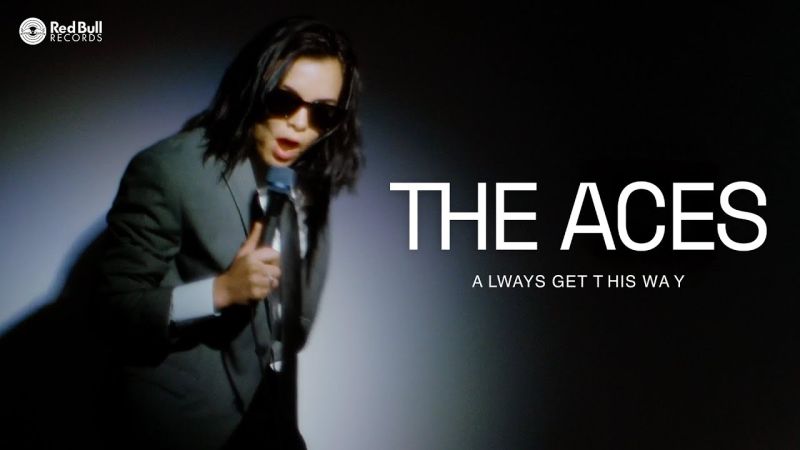
Always Get This Way
Mental health is obviously a very internal experience, so it can be hard to explain to people who haven’t had one, what a panic attack truly feels like. But I think that's where music is such an important tool. Instead of saying, “I feel anxious”, you can have someone listen to a song that evokes deeper emotion.
What was it like to share such personal experiences through an album?
Cristal: At first it was really scary, because I thought no one was going to care. Like yeah I have panic attacks, but some people have it way worse. Who am I to stand up and tell these stories? But with some coaxing, writing about it kind of opened the floodgates.
We experimented a lot with sounds and translating those anxious feelings. Like "Always Get This Way" is really in-your-face. The drums are loud and smacking. The vocals are delivered really aggressively. With "Solo", we created this kind of weird, disorienting feeling of hallucinating or dreaming. And the admission felt completely liberating. Like, “This is who I am, and sometimes I am kind of hard to deal with.” That acceptance of self was a big turning point in my mental health.
Before we knew it, this album became this really energizing, freeing way to get our emotions out.
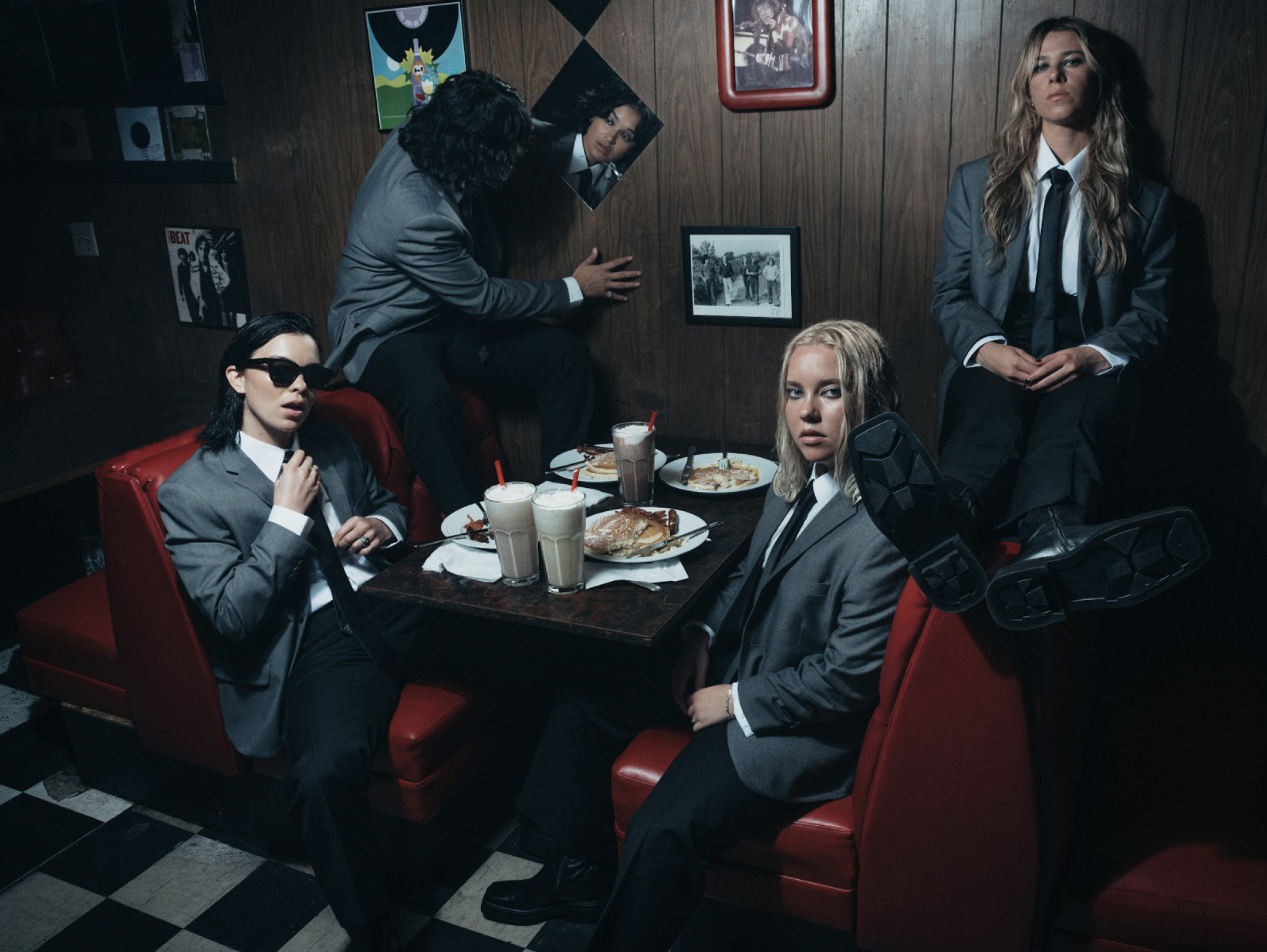
McKenna: Obviously, the songs are more about Cristal's experiences, but I think we all knew with this album, we were going to be talking more about our hometown and religious upbringing. And it took a while to get to that point, where we felt ready to talk about our collective experiences. I think that comes with time, because it would have felt really scary to talk about it years ago.
I was reading the album bio, and in one part, you guys talked about how making this album was a bonding, almost childlike experience. When I hear that, I imagine the 14-year-old version of myself writing posts on Tumblr — because I'm a writer and Tumblr was where I first discovered writing. And I was just on there because I loved it. There wasn't any pressure to make a career out of it. Writing just felt good.
I'm curious what it was like to tap into those younger versions of yourselves now that you've reached adulthood? Especially after having gone through things like leaving the church, or for three out of the four of you, coming out as queer. You all sort of gained this freedom and agency within adulthood that you might not have had when you were younger, but you were still able to connect to that younger you who just loved music for the sake of music. And I imagine that music was the thing you would turn to when you were closeted or confined within the church.
How did it feel to tap into 14-year-old you, but with the adult perspective you have now?
McKenna: I think it's hard to be young professionals in a culture that's so ruled by capitalism and productivity. It's amazing that we get to do things that we love, like music and writing, but that also comes with some loss. Societally, we're expected to meet all of these metrics, and it's really hard to balance doing something you love while not letting outside pressures cloud your expectations.
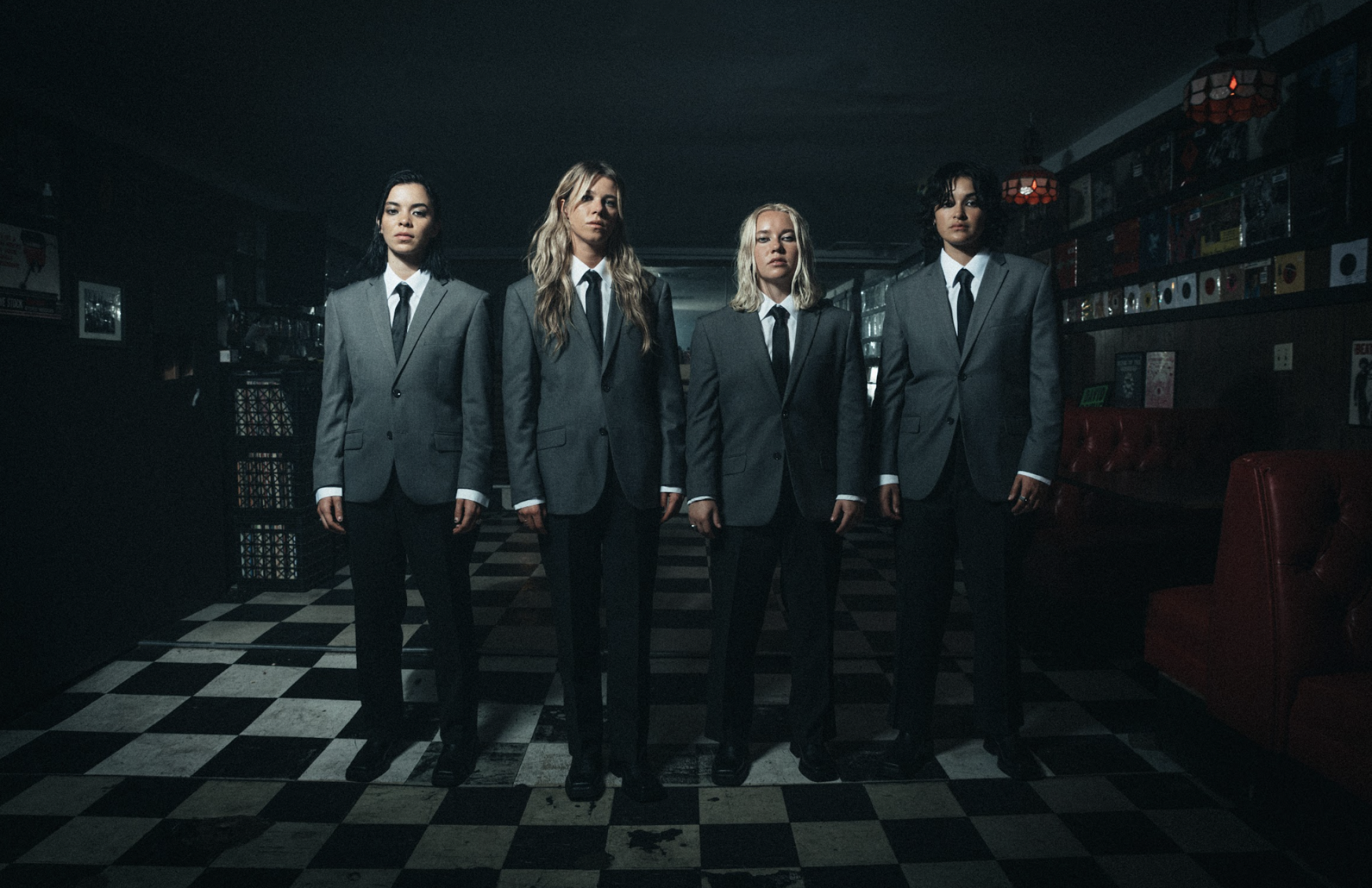
Cristal: All of these hopes we had for our second record "Under My Influence" were immediately wiped off the slate once the pandemic began. It was this question of, "Okay, if you can't tour this music. If you can't be this artist version of yourself that's perceived by the world. Do you even like the person that's doing all of this?" And that was a hard ask, because for a minute, I don't think I did.
It's scary to come to that realization, but it pushed me to find that version of myself that I actually liked. So going back to 14-year-old me who did things because it felt good and she was inspired and wanted to connect with her friends. I think we all felt like we all needed to ask ourselves those questions within our band: What is important to us? Do we still make music because we love it?
We went into the studio to discover that. And what happened was this really beautiful exploration and reflection on why we make music. Lucky for us, to answer your earlier question on if we still like making music as much as we did when we were younger, the answer is yes. And honestly, even moreso. Because the more articulate and more versed we get in our craft, the better the music gets.
Katie: I think it’s cool that you brought up making this album at this age. It made me think about how scared I felt when we put out our second record. At the time, I wasn't publicly out when we released our first few songs using she/her pronouns, and I remember how challenging it felt.
But with this upcoming record, it's totally different. We're so much older. We're coming out of all of these tough experiences together. Our music just feels so authentic, and I think that comes with time and age. We've talked about this before that you can't write a record like this when you're 20. So I think it's cool to see the evolution of our music as we've grown up, and to finally tell those stories that we’ve wanted to tell since we were younger.
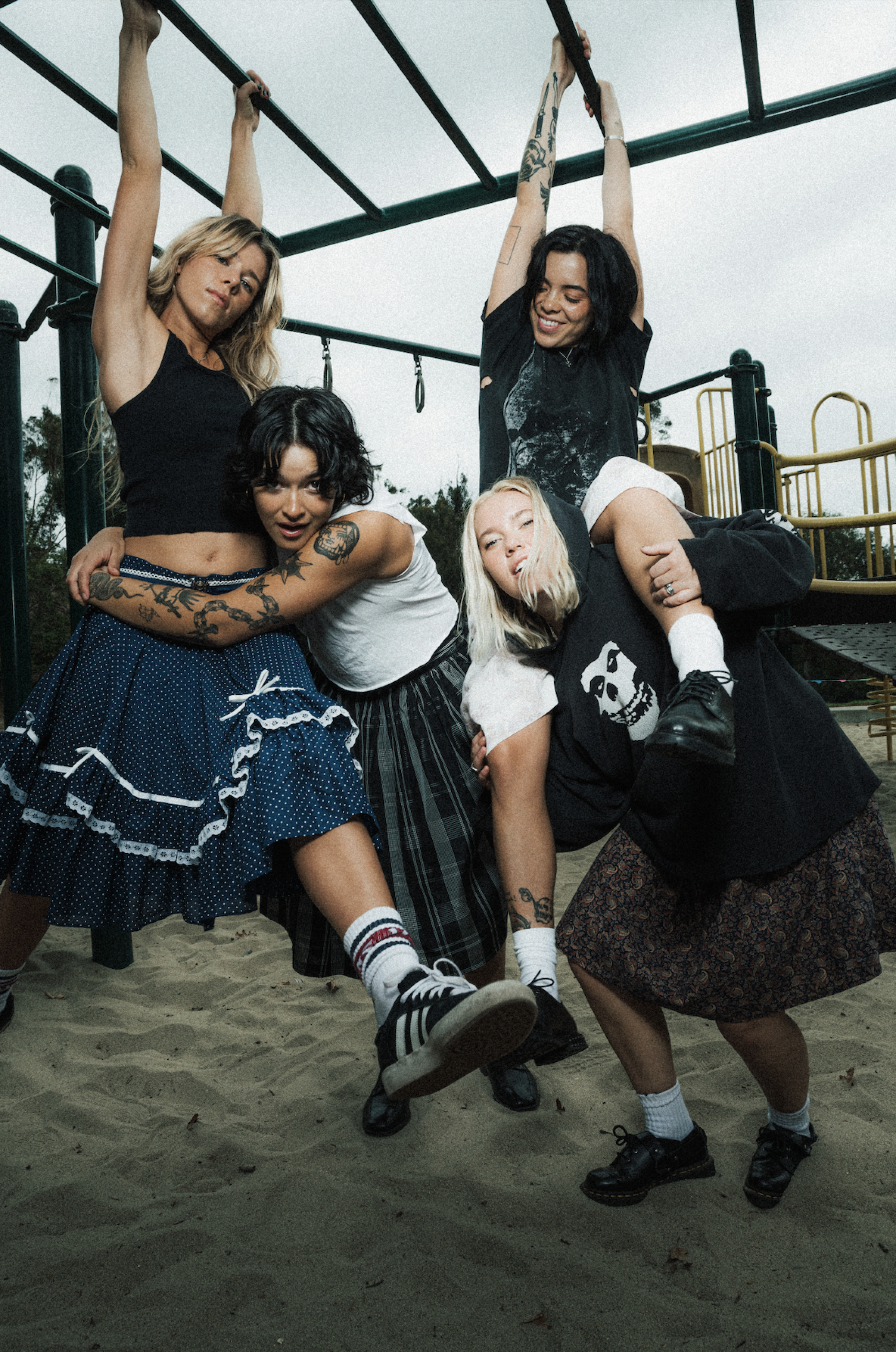
It's awesome that you guys have created that safe space. And going off of that, I'm obsessed with the photo shoot you did where you're wearing hoodies and dresses as a throwback to when you'd dress a little rebelliously at church. You sort of explored, oh man I never know how to say this word… androgyny?
Together: Androgyny!
Yeah! I feel like I see that theme a lot. Not just within this album, but also as a band in general. You sort of challenge a lot of dualistic thinking and mix things that seem like opposites. Like right now, you mention how talking about mental health can feel really scary, but you have a whole track where you sing, "I always get this way!" You're almost celebrating being open about it. Same thing with all of you leaving your religion. There's a lot of people who leave the LDS church, and they hate where they grew up. They never talk about it or acknowledge their hometown. But you guys love Provo. You write songs about it. Do you guys feel like you do that purposefully? Challenge that dualistic thinking?
Cristal: For sure. I think that we're a very nuanced band, but I think people in general are very nuanced. Nothing is black and white. And speaking directly about our relationship to our hometown, it's been a very tumultuous one. I'm able to see the good in the way we were raised, but I'm also very aware of experiences that were really traumatizing. There were things that really affected my mental health that I wouldn't want anyone else to go through.
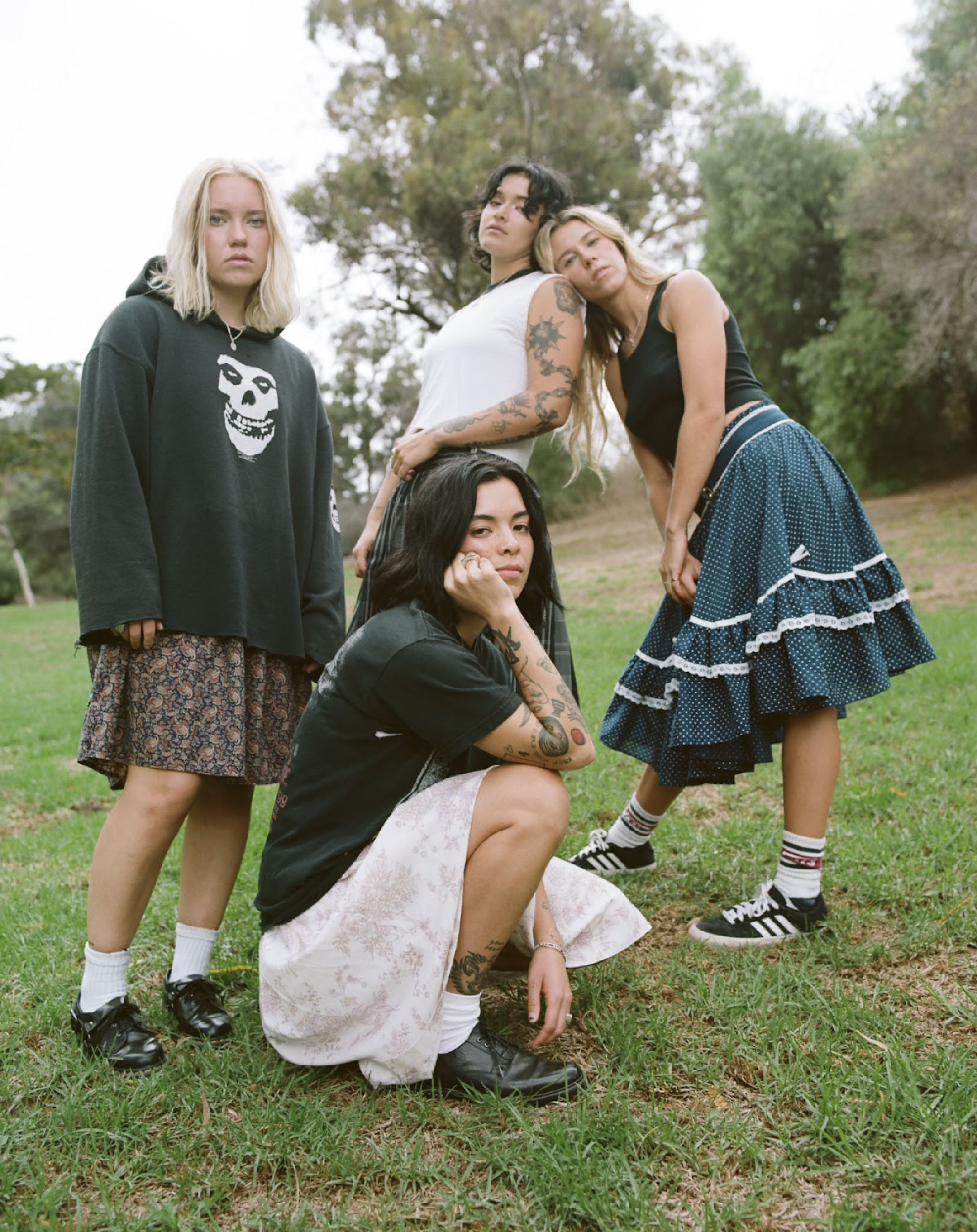
But we're all from there. And there are so many kids who are just like us, who didn't get to choose the circumstances they grew up in, and who need the people that got out to inspire them. For us, I think it's about continuing to spread that awareness in our hometown that you don't have to fit the status quo. You can change your life and decide to leave the community if it's not suiting you.
It's really important for us to keep being like, "Hi! We're queer! We're all women who play in a band and tour and we've left church, and this is an option for you!" Even outside of Utah, so many kids feel like they're stuck in their hometown or religion, or doing things that feel inauthentic and suffocating.
I think our band — and thank you for saying that earlier — it's a safe space. We're trying to create that space because we needed it so desperately as kids. The Aces is a constant reminder to go against the grain of things you were taught that no longer resonate.
McKenna: I feel like that nuanced part of our band naturally happens because we've always been so different. Like yes we have a lot of similarities, but we also have such individual experiences and personalities. It allows us to explore a lot of different things.
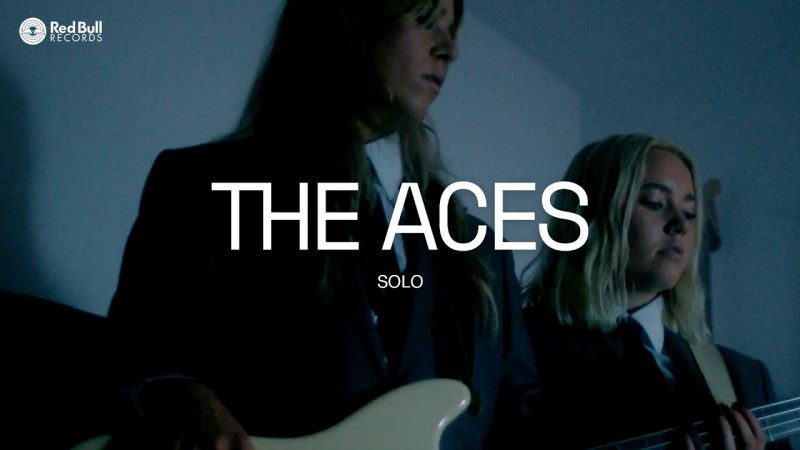
Solo
For sure! You guys occupy a lot of spaces — the music industry, the church, the LGBTQ+ community.
I feel like some of these spaces are kind of missing the mark when it comes to mental health. And our organization talks a lot about this, how advocacy has been co-opted by big brands and has become very surface level. Like, "You're sad? Eat a pear and go outside!" But it doesn't actually help anyone. What do you wish you could see more of when people talk about mental health, both in these specific spaces you're in, but also just in general?
Cristal: We've talked about this a lot with songs like "Always Get This Way", but I think my biggest one is that we don't really have tolerance for people who struggle mentally. I think there's this idea to fix people as quickly as possible and get them back onto the "normal", societally acceptable path. But mental health is an ongoing process. There could be months or years where someone is not able to perform at a certain level that's expected of them.
I'd love to see how we can help people instead of being like, "Oh, you're cripplingly depressed? You're super anxious? Your OCD is making it so you can't really function? Let's get you on some medicine really quick." Instead of, "Something's flaring up for you right now? Let's get realistic and talk about what the next few months might look like." That also extends to resources. I think it's very, very expensive to go to therapy and get medicated. People don't have the financial resources that they need. So those are my main two: tolerance and financial support.
Katie: Just this morning actually, I was thinking about how scared and unsafe I felt about coming out. So something people can do is just allow someone more space and time to figure out what they're going through. Sometimes it feels like you have to know. Like, you have put a label on things, or you have to sort out your shit right away. But with our own band, it was a place that allowed me to feel comfortable and take time to process all my emotions.
Also as Cristal mentioned, resources are huge. Just the ability to find the right tools or people can make a big difference. Especially in places like Utah, where resources are so scarce. Everyone's kind of in the same world, so if you were to step out of that, it kind of feels like you're going into uncharted waters. Luckily now, with technology and social media, we can share those important resources and stories with people who are struggling.
McKenna: I think what upsets me is that approaches to mental health often feel like a "one-size-fits-all." But it's such a unique, nuanced experience for every single person, and different things will help different people. I think there needs to be more space for people to explore options, instead of feeling pressured to do certain things because they work for someone else.
Community is also huge. We need to give people safe spaces to feel hopeful and optimistic — which I think we try to do with our band. Especially being raised in such a religious area, it's been so healing to find community outside of that.
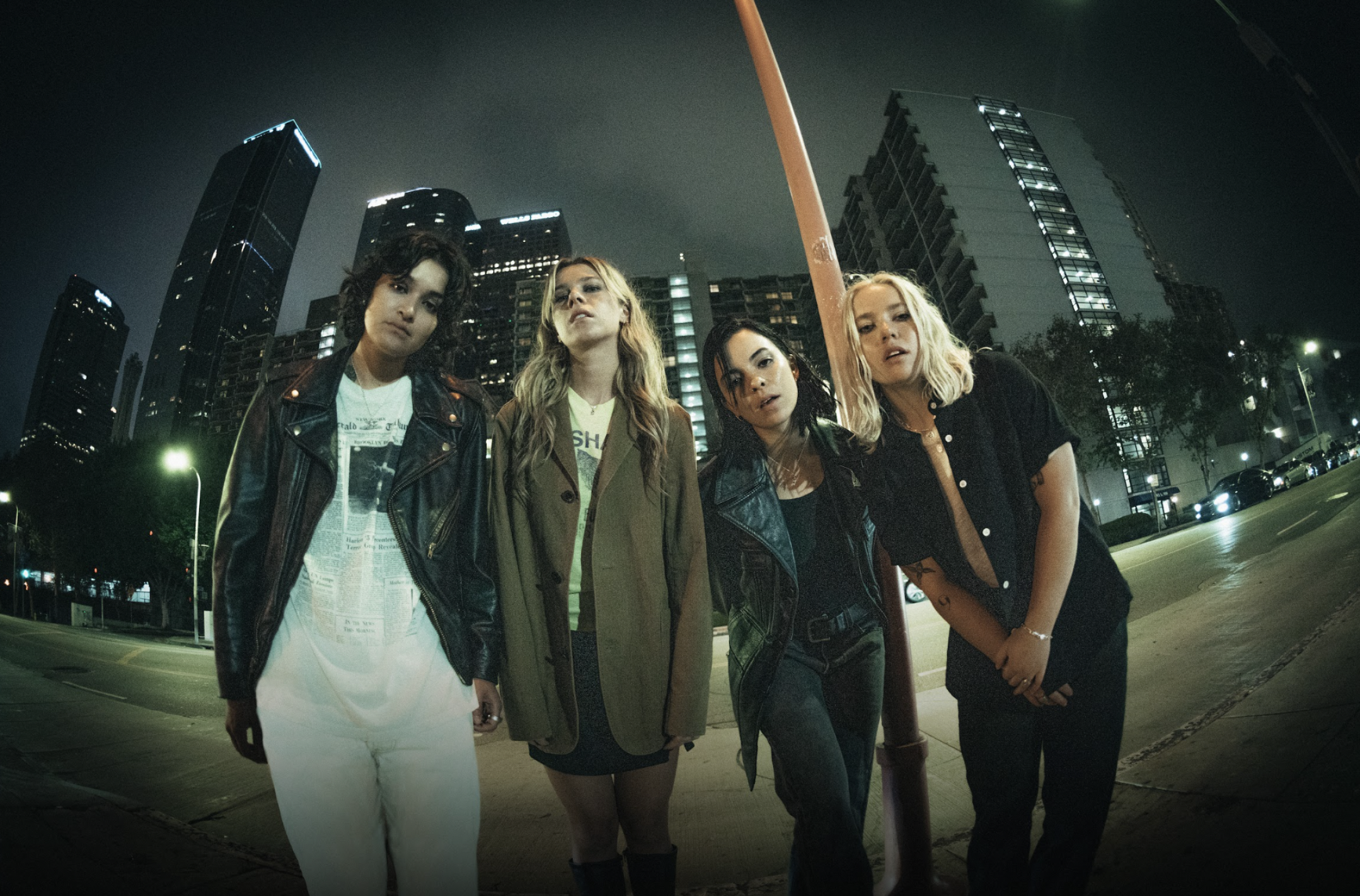
Yeah, we talk a lot about the medicalization of mental health and how people have turned it into this equation of: "You struggle. You get diagnosed. You do this therapy, and get on this medication. Then you never have to suffer again." Which is so unrealistic, because mental health is something you deal with every day. Also, recognizing systemic issues like capitalism, accessibility to treatment, anti-trans legislation — all of those things affect mental health.
That's where art and music can become this safe space for people to process all of their feelings, and I want to give you guys your flowers for being that source of hope. Cause I think that’s one of the toughest things when it comes to mental health, is when you're really struggling and don't have anyone to look up to. It can get really dark and lonely, and that's when the depression kicks in. You kind of want to give up, because you don’t really see a way through.
So when you see people like your band going, "Hey! I went through everything you're going through, and survived." That's such a powerful message.
To wrap up, you say this is one of your most honest albums yet. What allowed that openness to happen, and what do you hope people take away from listening?
Cristal: Before the pandemic, especially when we'd be touring, it was really easy to compartmentalize things we didn't want to deal with. But after spending some time at home, it really forced us to reflect on the scariest topic we've addressed so far, which is our childhood.
There was a lot going on between the four of us as we went through our own personal journeys of identity. I think after the pandemic, for the first time in our lives, we found ourselves on the same page about topics like religion and sexuality. That allowed for some very honest conversations about the sources of our anxiety and pain.
Because where we come from, it's very, very taboo to talk badly about your experience within the church or reflect on the pain it caused you. There's this attitude of, "You don't have to be a part of this community, but why do you need to keep talking about it?" But no. I think we need to talk about the things that traumatized us. We need to talk about growing up queer and feeling like we didn't fit in with this community, and how that's still affecting our lives. I think for the first time, we felt like we were ready to explore that.
I think that's why it's our most honest album yet, because for the first time, we wholeheartedly went to those places that are really scary to go to.
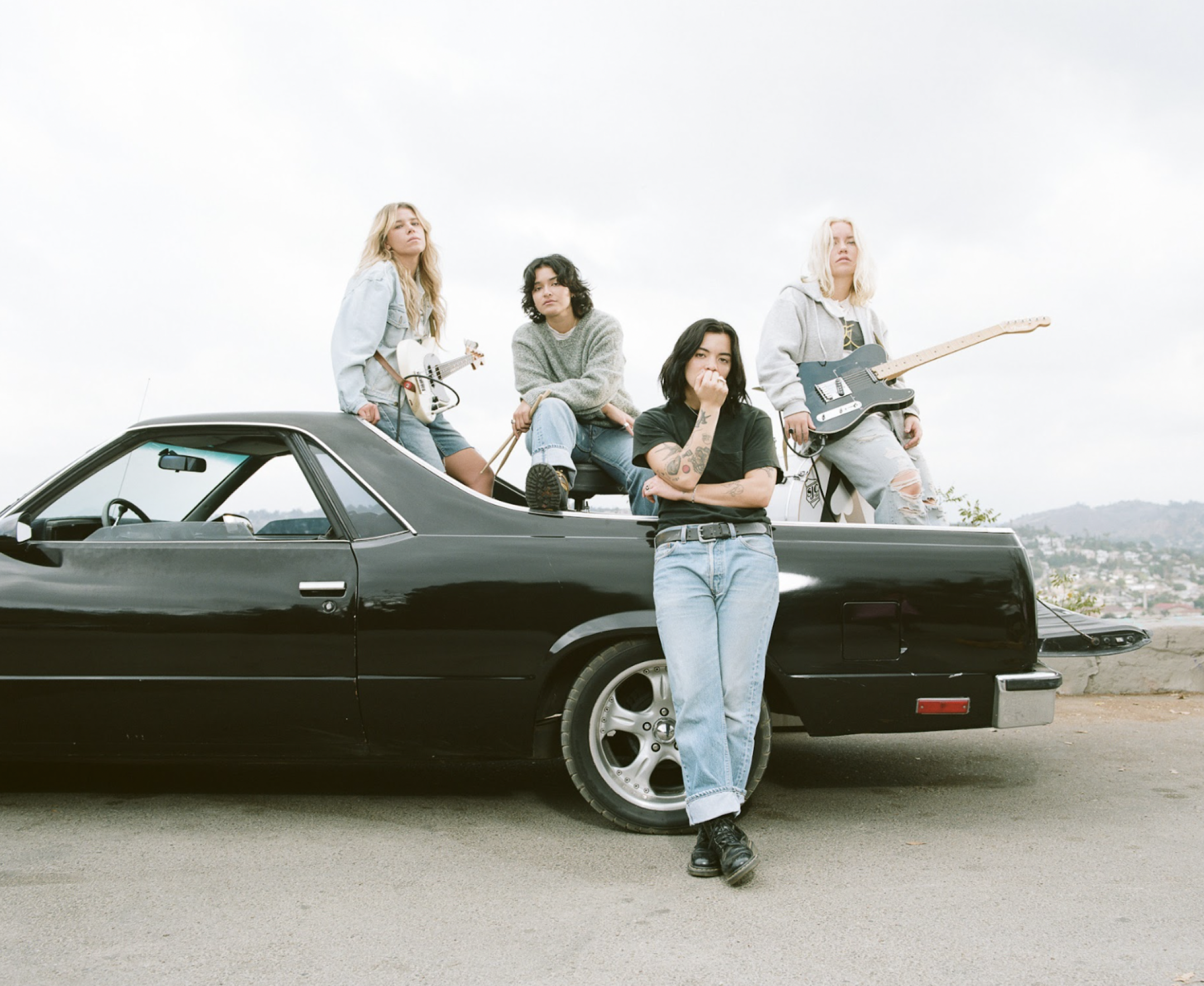
McKenna: We had to have enough distance from it to not be scared anymore, because that fear is very programmed into us. They teach you that the worst thing you can do is to know it, be a part of it, and then leave and talk badly about it. Cause if you do, “You're going to hell!” So to have enough distance and realize, okay, this isn't true. We're valid. We're allowed to talk about this.
Katie: When you were giving that equation earlier of "diagnosis, medication, you're better forever", it reminded me of this metaphor about grief. How sometimes, when something really hard happens, it can almost feel like you're in a really tight jar. And the goal isn't to break the jar, but to get into a bigger one and give yourself more space. You might still feel all these emotions, but now you have more room to figure them out. So we hope with this album, after people listen to it, they feel like they have more space. Because ultimately, the goal of The Aces is to make people feel a bit more understood, safe, and less alone.
Cristal: I think my biggest goal in life is to be what Tegan and Sara were for me. Like when I was in high school, finding them changed my life. Truthfully, they made me feel like I could have the life I have now. Before that, I didn't think I could be queer and out and successful and happy. As soon as I found them, my whole world was flipped upside down. That's when I started telling myself, "I want to be like them!" My hope is that we can give that same feeling to the next generation.
<>
“I’ve Loved You For So Long” comes out June 2nd. Keep up with The Aces at www.theacesofficial.com
Photo credits: Julian Burgueño
Apoya nuestro trabajo
Nuestra misión es cambiar la manera en que el mundo percibe la salud mental.



















